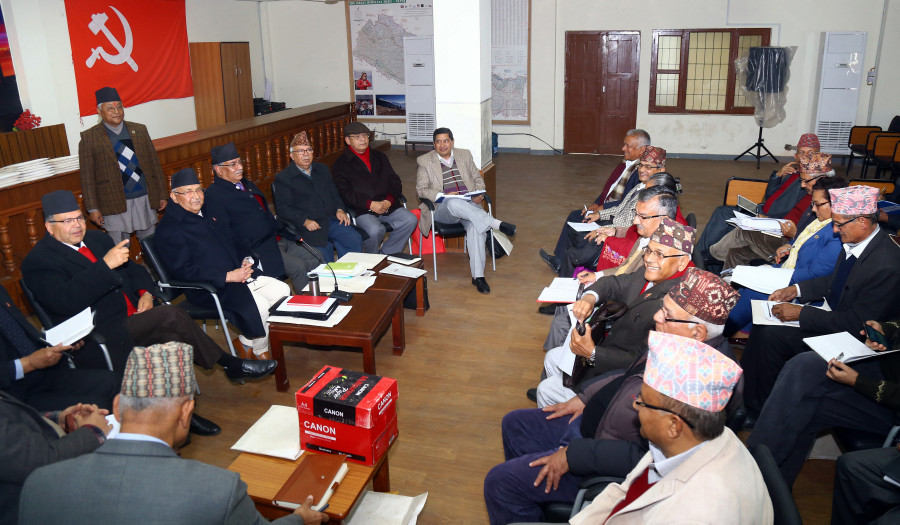Politics
6 reasons why the Nepal Communist Party's Standing Committee meet was postponed
The ongoing Standing Committee meeting has been postponed for a week.
Babita Sharma
The ongoing Standing Committee meeting of the ruling Nepal Communist Party has been postponed for a week, after being scheduled for Friday. The latest postponement comes after parleys between the two party chairs—KP Sharma Oli and Pushpa Kamal Dahal—over the ongoing crisis within the ruling party. The meeting started on June 24 but has not convened since July 2.
The next meeting has now been scheduled for July 17. Party spokesperson Narayan Kaji Shrestha said the two chairs will continue to hold talks and other senior leaders will also sit for talks, if necessary. One party leader said there are high chances of a party Secretariat meeting by then.
The party claims that it had to postpone the meeting due to recent natural disasters, including floods, landslides and the Covid-19 pandemic, and the need to tackle them.
However, despite the party’s claim, there are political reasons behind the postponement of the Standing Committee meeting, including the internal power struggle, pressure on the top leaders to find a solution, and Chinese concerns.
Oli-Dahal wish to prevent the party from splitting
The primary reason for the deferral of the meeting is to prevent the party from splitting. There were fears that increasing polarisation between the two sides over the prime minister's resignation may ultimately lead to a party split. The two chairs had laid the blame on each other for trying to split the party. To prevent an imminent split, senior leaders had suggested deferring the meeting while Oli and Dahal sit for discussions.
There have been a series of talks between the two chairs but little of substance has emerged. Matters only worsened when Oli suggested that Dahal wait until the party convention and the next election to claim the party chair for himself and the prime minister’s chair, respectively. Leaders privy to matters said the two chairpersons were not in favour of splitting the party and agreed to postpone the meeting for seven days. Sources say that President Bidya Devi Bhandari is also against a party split.
Pressure from within the party
There were no real agendas discussed even seven days after the commencement of the Standing Committee meet. Despite earlier agendas, a new issue—resignation of the prime minister—took centre-stage. That completely shifted the mentality of the party leaders and the meeting. Dahal’s faction, which called for Oli’s resignation as both prime minister and party chair, openly confronted the Oli faction.
Second-rung leaders have also increased their activities with an objective of keeping the party intact while splitting leadership responsibilities in consensus. After initiation from Agriculture Minister Ghanshyam Bhusal, 11 Standing Committee members have parlayed with the leadership. Bhusal passed on the desire of the Standing Committee to prevent a party split and urged the leadership to take the time to find consensus.
The ‘message’ from the Communist Party of China
Many observers also believe that the Communist Party of China is one of the reasons behind the postponement of the meeting. Chinese Ambassador Hou Yanqi passed on the message from Beijing to the ruling party leadership during her meetings with leaders. The message from Beijing was to sort out matters with further talks. Any decision taken in haste should not have any untoward effect on party unity, Hou is reported to have said. She held meetings with Dahal, and senior leaders Jhala Nath Khanal and Madhav Kumar Nepal. Hou's meetings with leaders have also come under criticism.
Attempt to prevent Indian 'interference'
The internal power struggle in the ruling party also raised concerns in New Delhi. Prime Minister Oli on June 28 had claimed that India was hatching plots to unseat him. Since then, some Indian media have aired baseless and sensational claims about the prime minister’s relationship with the Chinese ambassador, leading to a ban on Indian news channels in the country by cable providers. The Nepali Embassy in New Delhi has also taken note of such reports and expressed reservations to the Indian Ministry of External Affairs.
A possible step by the prime minister
Following the Cabinet's decision to prorogue the Parliament, many had assumed that the prime minister would take some political steps amid the increasing hostility towards him. The Dahal-Nepal faction was afraid that the PM could issue an ordinance to split the party and then side with Nepali Congress, or even go for midterm elections. The Standing Committee meeting has been postponed to prevent Oli from taking any drastic political steps.
The pandemic and natural disasters
As claimed by the party, the coronavirus pandemic and natural disasters are also a reason behind the postponement. “At times of disasters striking the nation and loss of huge property in districts like Sindhupalchok, the party has decided to swing into action to help prevent disasters, and has decided to postpone the Standing Committee meeting for seven days," said party spokesperson Narayan Kaji Shrestha.




 13.12°C Kathmandu
13.12°C Kathmandu















